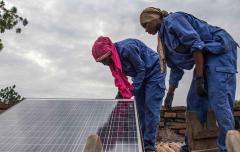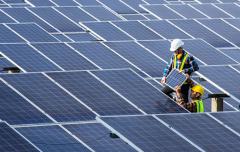Damilola Ogunbiyi: Hitting reset on sustainable energy
This article was first published by United Nations Association – UK (UNA-UK)
As COVID-19 underlines, energy can be the difference between life and death. We must rapidly ramp up progress to ensure everyone has access to this fundamental resource.
The COVID-19 pandemic has changed the world as we know it. With business as usual being thrown out of the window, new opportunities are emerging that could pave the way to a more prosperous future for all.
This is particularly true for the energy transition. As countries continue to rebuild from the pandemic, clean-energy investment can support them to recover better, and use this unique moment to reset their economies and close energy access gaps.
Progress is desperately needed. Despite energy’s critical role in catalysing economic development and supporting people’s health and livelihoods, the world remains severely off track to achieve universal access to affordable, reliable, sustainable and modern energy for all by 2030, as called for by Sustainable Development Goal (SDG) 7.
Without electricity, people lack a basic necessity for poverty alleviation and the ability to build resilience to the global health crisis. Many are forced to cook with dirty fuels that further put them at risk of respiratory diseases like COVID-19.
According to data from the latest Tracking SDG 7: The Energy Progress Report 2020, 789 million people globally still lack access to electricity and 2.8 billion people – over a third of the world’s population – are unable to cook cleanly and safely.
As the COVID-19 pandemic has shown, energy access saves lives. This further adds to the urgency and importance of faster progress in delivering sustainable energy for all.
But if current trends continue, we will not deliver the promise of universal energy access by 2030. We can no longer accept this incremental rate of progress. We must renew our commitment to an integrated energy transition that accelerates the pace of progress on access, prioritises energy efficiency and supports faster growth of renewables.
Meeting SDG 7 by 2030
If we look at the core targets of SDG 7 in more detail, we can see where the challenges and opportunities to accelerate progress are.
For example, on electrification, significant progress has been made since 2010, with the number of people without access to electricity reduced from 1.2 billion to 789 million in 2018. The decline was most significant in Central and Southern Asia, where the deficit shrank from 441 million in 2010 to 152 million in 2018.
The electricity access challenge remains heavily concentrated in Africa. The continent’s share of world population without electricity access increased from 48 to 70 per cent between 2010 and 2018. We estimate that 565 million people still lack access to electricity across Africa. Beyond these numbers are millions more people in the region who only have minimal or unreliable access.
While electricity access can often dominate the headlines, the ongoing global challenge of access to clean cooking remains a major concern. Lack of political urgency or sustained investment, the absence of market-enabling conditions, and poor institutional frameworks have hindered the development of the clean-cooking sector. If current trends persist, almost 30 per cent of the global population will still be without access to clean-cooking solutions by 2030.
Slow progress on energy efficiency is also undermining efforts towards all SDG 7 targets and carbon reduction. Since progress peaked in 2015, we’ve seen a continuing decline in the pace of progress on energy efficiency that is far from the 3 per cent rate of annual improvement required each year. This target remains within reach, but coordinated efforts are needed between governments and partners to double annual investment in energy efficiency by 2025, and double it again between 2025 and 2040, according to analysis by the International Energy Agency.
To encourage this investment, countries and organisations need to make public commitments – for example, through nationally determined contributions under the Paris Agreement and cross-sector energy compacts like the Three Percent Club on energy efficiency – to support the implementation of energy efficiency economy-wide.
Renewable energy has made exciting progress over recent years, but a renewable revolution is still to be fully realised. For example, decentralised renewable solutions that will be essential for providing energy access to millions are not being deployed fast enough, and renewable energy uptake is only moving at a moderate pace.
With the urgency of the climate crisis being felt globally, countries should focus on accelerating integrated and comprehensive energy policies that support greater uptake of modern renewables for electricity, heat and the transport sector.
This is our reset moment
Now, as the world continues to deal with the ongoing and growing impacts of COVID-19, countries have a once-in-a-generation opportunity to recover better and accelerate their energy transition.
This is a significant opportunity for those nations with large access gaps. According to SEforALL’s Recover Better with Sustainable Energy series, countries that commit to an ambitious recover-better strategy can deliver long-term economic growth, new jobs and sustainable energy for all in the long term.
Investing in clean energy could unleash a wave of new jobs. As the global economy is increasingly being powered by clean and efficient sources of energy, research shows that dollar-for-dollar investments in clean energy create three times the number of jobs compared with fossil fuels. Every 1,000 customers connected to decentralised energy solutions – like solar home systems or solar mini-grids – support approximately 25 jobs.
Countries will also see improved health, agricultural and gender outcomes, helping to ensure that women and girls benefit from a green recovery. A gender-sensitive approach is particularly key as research shows wages for women with access to energy are 59 per cent higher than those without.
By acting on the enabling measures put forward in our Recover Better series – including investing in energy efficiency, setting roust policies, eliminating fossil-fuel subsidies and declaring a moratorium on coal-fired power plants – countries will benefit from increased GDP, affordable energy provision and improved agriculture, gender and health outcomes.
Crucially, this reset can also spark progress at the speed and scale needed to meet SDG 7 and help put the global economy on a trajectory in line with the Paris Agreement and the entire SDGs.
In this moment we must also redefine what we consider energy access to be. For too long, people have seen it simply as the ability to turn on a light. Yet energy access cannot just be considered in terms of a minimum level of access. We must also ensure it provides energy for development, for productive use and economic opportunity – helping millions of people live dignified, healthy and prosperous lives.





